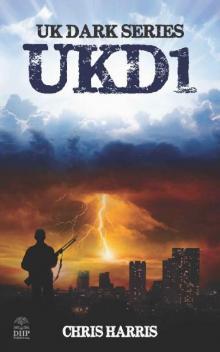- Home
- Harris, Chris
UK Dark Trilogy Page 2
UK Dark Trilogy Read online
Page 2
Security: This was also on my mind. How would I protect my family and keep them safe when the social order might potentially collapse and people might want what you have out of sheer desperation or greed? Weapons. Now you’re talking! I just knew the boy in me was going to enjoy buying this part of the list.
I often went clay pigeon shooting, and occasionally game shooting, with a few friends who lived out in Shropshire, so I was already in possession of a shotgun licence, and owned a Beretta Silver Pigeon over-and-under shotgun, a decent all round gun for both clay and game shooting. But was one gun enough? No. You would need at least one for everyone in the family. My children might not be old enough to handle a gun, but one day they would be, and the guns would not only serve as protection, they would also put food on the table.
I discovered that you could buy second hand shotguns for as little as two to three hundred pounds, so a trip to my local gun shop was definitely high on my list, along with enough cartridges to last forever. That was going to take some working out. Air rifles were also great for small game such as squirrels, rabbits and pigeons and under current UK law, providing they were under 12ft lb power, there were no restrictions on owning them. I didn’t know much about air rifles but I was sure the gun shop could educate me.
Security also covered physically protecting the home from people breaking in. No matter how good the locks were on your door and windows, a brick through the glass would soon let them in. I was reluctant to turn my home into a prison or fort, but then I thought about the CME hitting and everything going wrong. Who cared? It was what worked that mattered. I would need to give this careful thought.
Communication: Another important item on the list. We would need to find out what was happening out there in the world and also, when it was safe to leave the house to look for supplies, it would make sense to be able to contact home. Mobile phones and televisions would obviously not be working, so that left radios for receiving news broadcasts, (if there were any), and two way walkie-talkies so that we could communicate with each other.
I already owned a couple of walkie-talkies which had proved useful on skiing holidays for keeping in touch with the other people in my group, and saving on expensive phone calls.
A wind-up radio was also probably a good idea, as we wouldn’t be reliant on batteries, which would be hard to replace. But all electrical equipment would be fried and useless. All the books I had read mentioned Faraday cages, which would protect electrical devices from a power surge. These are insulated metal boxes or cages which direct the current from the power surge around them, and therefore protect any devices inside. I decided to get or make one of them.
Fuel: I decided not to worry about that, because if every modern car was out of action, there would be plenty to syphon off from the petrol tanks of all the dead cars out there for my trusty old Land Rover (if it survived the EMP). That should also fuel the generator I had for working on houses with no power. The generator should survive the EMP because it had a simple pull-start design, with no electronics. It would be necessary to charge or power the electrical items I put in the Faraday cage.
On reflection, I decided that a few jerry cans of fuel wouldn’t take up much space and I could always use it for the lawn mower and chainsaw and replace it when necessary.
The chainsaw would be essential for providing wood to keep the log burners going in the winter. It would be the only way to heat the house and provide hot water for washing and cooking when the gas ran out.
Cash: If or when the EMP hit, all electronic ways of banking would cease to work. In other words, cards would be useless. I reckoned it would be a few days before people realised what trouble we were all in, and therefore cash would still be the only way to buy goods. A couple of thousand in cash kept in the house seemed sensible.
Water: How long would the water keep flowing out of the taps? Probably not very long, as the pumping stations would be out of action straightaway. Luckily, there was a lake in the park at the bottom of our garden, which was fed by a small stream.
That could supply all the water we would need, but it would not be suitable for drinking. I’d need to investigate various ways of purifying water. A supply of bottled water was therefore essential in the short-term, but it would be too impractical to store enough water in the long-term.
Location: My thoughts turned to the holiday cottage we own in Wales. We had bought it about 15 years before when prices in that part of the country were dirt cheap. The cottage needed a lot of work doing to it, and Becky and I had had a great time going down at weekends to do the place up.
It was a three bedroom cottage in a quiet road close to the coastal town of Barmouth. Although we’d loved going there over the years, the children’s school and other commitments (such as rugby, hockey, cricket practice, classmates’ parties etc) had increased, leaving few weekends free. If you’re a parent I’m sure you’ve got the picture.
So rather than selling it, we’d chosen to rent it out as a holiday cottage and only managed to get there two or three times a year.
It would be a perfect location to run away to. It had good access to water from all the nearby streams, and potentially there would be an easy supply of food from all the sheep roaming about. Also, if you knew what to do and where to look, the sea shore could provide a plentiful supply of food, from edible plants, to shellfish and not forgetting all the fish in the sea. If only I knew how to fish. As the cottage was rented out for most of the year, stocking it with what we would need would be a problem, so I rejected that idea.
We also own a towing caravan, which we use for weekends away and summer holidays when the cottage is let. A caravan would make an ideal survival home, being mobile and designed to run on either gas or electric. So technically, as long you had enough bottled gas and could keep the battery charged, it would be self-sufficient.
The electronics in it probably wouldn’t survive the EMP, but everything else should work.
Becky and I discussed the “where to go” issue and decided that if the worst did happen, it would be sensible to stay at home where our supplies were stored. But if, for whatever reason, we needed to leave (for instance, if our house was no longer safe) we would need to make the best, and hopefully the right, decision at the time.
We also had discussions about who to tell and, if the event happened, who we would be able to help. We decided against telling friends or family about our plans. But if they saw all our supplies building up in the garage, what would we say then?
I had the idea of putting the crates when filled into black bin bags before stacking them with a symbol or code word on them, so that we would be able to identify what was in them when we needed them.
I would tell them they were my work tools and equipment and that Becky had made me tidy them away (not very plausible I know). If it became a problem we decided that I would partition off part of the garage with a stud wall, tell people that this was my work storage room and that way it could be kept out of sight.
Should we offer help to friends and family if they needed it? Well, if the event happened, then of course they would need it.
Food and water were going to be scarce commodities (and probably worth killing for).
My sister Jane and her family lived close by, and we always spent a fair amount of time together. Occasionally we went on holidays together and did a lot of socialising with her and her husband Michael. They have three children and as our children are all roughly the same age, it was great that they were close to their cousins and considered them to be part of our family.
Of course we would help them. How could I live with myself if something I could have done, but didn’t, caused them to be harmed in any way? But we couldn’t tell them about our plans, we would just have to wait and see what happened.
So, with the list complete and the planning discussed, we went back to our normal lives. Our food supplies slowly increased. I bought the equipment part of the list when I came across things. I went out and
bought a few more shotguns and a cool looking air rifle with a silencer and scope.
Whenever I bought cartridges for my shotgun, I bought an extra case and put them in the store. I always kept a few 25ltr jerry cans of petrol and diesel in the garage and got into the routine of topping them up when I’d used some.
I built a Faraday cage in my garage. It was a lockable metal cage with the floor insulated with a rubber mat laid over some polystyrene insulation.
The good thing about it was that you didn’t need to disguise what it was.
I would lock my power tools away in it and it just looked like a tool safe, “hidden in plain sight,” as they say, so nobody would question what it was. I put a couple of car batteries in the cage, along with a wind-up radio and my walkie-talkies.
After about twelve months, the back wall of the garage was starting to look a bit ridiculous, with the bin-liner-covered storage boxes building up to become a wall in their own right. At this point I built a partition across the back of the garage with a lockable heavy duty door on it. Again, it looked just like a secure area for me to store my tools.
When it came to the planning and storage stage Becky came into her own. She created a detailed spreadsheet with lists of everything we’d already bought and what we still needed to buy. She also prioritised them, so that the important items were never forgotten. Once every month or so, we sat down and she highlighted supplies we should concentrate on sourcing next.
Don’t get me wrong, this was not a full-time job with timescales and deadlines to meet, but a five-minute chat every month or so, with Becky reminding me that cooking oil or rice were just as important (if not more so) than me popping into the local gun shop to see if there were any bargains to be had.
“Okay dear, point taken, I’ll think about the boring stuff as well,” was my usual reply.
As all men know, there are times when you just have to accept that your wife is right. But I would still sneak that roll of razor wire I had just bought cheap into the garage and hide it under a blanket. Then I would break the news of my fantastic purchase in a few weeks’ time.
We began to keep chickens. Over the past couple of years, chickens had become the latest middle class craze and you could buy from a range of cheap to very expensive hen houses and coops.
As long as they didn’t become ill, they’d be relatively easy to look after, and the eggs would definitely taste better than from the supermarket. Stanley and Daisy, a couple of entrepreneurs in the making, set up a nice little business selling our excess eggs to the neighbours on the street.
In the meantime, Becky expanded our vegetable garden and researched and planned it so that vegetables of different types were growing and available to harvest for most of the year.
The months rolled by and buying that little bit of extra food every week and putting it in a crate in the garage became so normal it was just part of everyday life. It didn’t affect what we did, or where we went, it just became what you did, part of the routine. It seemed so normal you sometimes forgot why you were doing it.
But when you looked at the partitioned off area at the back of the garage, slowly filling up with food and equipment, and thought about what might happen if it did ever did hit the fan, then yes, it had cost some money, but it was the right thing to do.
And if I was wrong, then at least we wouldn’t need to go to the supermarket for dried goods for quite some time.
We created a survival file, with instructions on how to set snares and traps for animals, lists of edible wild plants, first aid advice and myriad sheets of other information that might be useful and could help to fill in any knowledge gaps we would certainly have.
I continued to read books about survival after various catastrophic events and even began to think of myself as a bit of an armchair survival expert; great on the theory, but could I do it when needed?
CHAPTER THREE
I kept an eye on the websites that gave information about solar activity in case they gave any advanced warning, but they never did.
Watching the news one night after the kids had gone to bed, something caught my attention. The usual end of the news, “light-hearted look at life” feature, designed to make you feel good after all the doom and gloom of the past half hour, was reporting on how far south the Northern Lights were going to being seen. In the next couple of days, towns and cities as far south as Manchester and Sheffield were likely to be treated to light shows most nights, as long as there was no cloud cover.
WOAH! STOP RIGHT THERE! My brain suddenly went into overdrive; Northern Lights as far south as Sheffield EVERY NIGHT! I grabbed the laptop and began searching.
All the official websites blamed it on an atmospheric anomaly that would extend the light show much further south than it would normally be seen, and in the Southern Hemisphere, much further north than usual (that’s right, I forgot to mention, in the Southern Hemisphere, they are called the Southern Lights. They’re exactly the same as the Northern Lights but they appear over the South Pole).
The websites were telling people to enjoy what could be a once in a lifetime opportunity to see one of nature’s most spectacular displays.
I went on to the American prepper websites. They didn’t tell me much either, so I went into a few of the chatrooms I’d looked at in the past.
All of them showed no activity for the past couple of days, which was very strange, as there were always discussions going on with people asking and other people answering a huge variety of questions. I then came across another chatroom and the last entry from two days ago was “GET READY HERE IT COMES!”
I sat back in my chair. I could feel my heart beating and sweat forming on my brow. It can’t be happening. Why aren’t we being told to get ready? What the hell is going on?
Then all at once it was obvious. Of course the government knew what was going to happen. But what could they do? You can’t suddenly supply everybody in the country with enough food and supplies to last until things get back to normal. It would be logistically impossible. They would concentrate on themselves, not out of selfishness and greed, but because they would need to survive to maintain some sort of government to keep the country running and to stop the complete breakdown of society.
Telling the population would not do any good, it would just lead to mass panic. The country would have to be kept in the dark to give the authorities, hopefully, enough time to put some sort of emergency plan in place, rather than wasting their time on public order issues. A cruel and cold hearted decision, but logically the only thing to do.
Were we ready? I didn’t know. We had a garage full of supplies, we had equipment that would help make life possible and easier after the event. We had weapons so that we could put food on the table, and if it unfortunately became necessary, to protect ourselves with. We had folders full of hopefully useful survival information we could learn from. But mainly, we had the knowledge of what to expect and some sort of plan in place.
This would make us a lot better off than most of the people out there, who would soon have nothing but the food in their cupboards at home and the hope that everything would start working again soon.
How long before we were hit? That was the question that only NASA could answer. It all depended on how fast the CME was moving. They can take anything between a few hours to five or six days to reach us. NASA have satellites and all sort of gizmos pointing into space, so they should be able to work it out. But they would never tell us, because they can’t. They have to keep the world’s population in the dark.
So we could have hours, or days, to make our final plans. Becky had already gone to bed, so I ran upstairs and tried to wake her gently, by turning all the lights on and stripping the duvet off the bed and shouting,
“Wake up, it’s happening, I told you it was bloody happening!”
OK, not very subtle, but in my defence, I was a bit “hyper” and over-excited.
Once Becky had calmed down and realised that the house was not on fire,
and I had slowed my speech down so that she could at least understand what I was jabbering on about, we went down to the kitchen for a cup of tea. I explained what the news was reporting, and also the complete lack of verification from any source apart from that one warning from the American prepper chatroom site. My wife sat there, thought about it for a few minutes and then said,
“So you want me to believe, that what we have slowly planned for over the past year or so is going to happen, based on absolutely no news and only a line from a nutter on a website in America.”
I stood up too quickly, knocked my tea over and was about to go on again about the Northern Lights and everything, when she held up her hand and said,
“It’s OK love, I believe you. I can’t actually believe it’s going to happen, but I trust you. You’ve done a lot more research than me, and why should I doubt you?”
After a quick kiss and a long hug, we sat down and tried to find out how prepared we were. We got the spreadsheet out and went through our list of supplies. I was amazed at how it had added up over the years. We appeared to have loads of absolutely everything, but would it be enough to last? What if we had to start sharing with our family or other people? How long would it last then? The answer was who knows. More supplies wouldn’t do any harm. We didn’t know how long we had until the CME hit, and as nobody else in the country apart from, hopefully, a few in government, knew what was potentially going to happen, we decided that now was the time to go shopping.
We sat down and drew up a list of priorities. It covered all tinned goods, all dried goods and as much bottled water as we could get our hands on. The best place to buy this in bulk from would be the local trade-only food warehouse, but it was 11.30 at night and it didn’t open until 8am. That was off the destination list for now.

 Zombie Castle Series (Book 3): ZC Three
Zombie Castle Series (Book 3): ZC Three UK Dark Trilogy
UK Dark Trilogy Zombie Castle Series (Book 4): ZC Four
Zombie Castle Series (Book 4): ZC Four![Zombie Castle Box Set [Books 1-3] Read online](http://i1.bookreadfree.com/11/zombie_castle_box_set_books_1-3_preview.jpg) Zombie Castle Box Set [Books 1-3]
Zombie Castle Box Set [Books 1-3] UK Dark Series (Book 1): UKD1
UK Dark Series (Book 1): UKD1